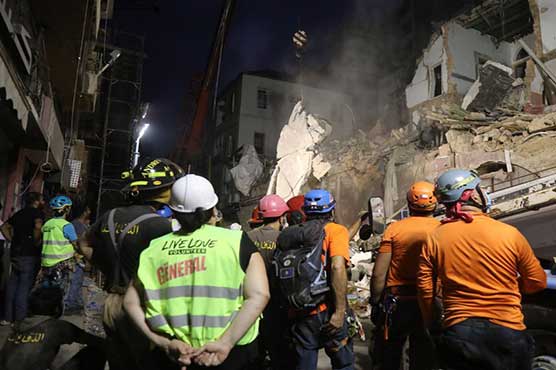'Pulse' sparks hunt for survivors one month after Beirut blast

The cataclysmic August 4 explosion killed 191 people
BEIRUT (AFP) - Rescuers resumed a search Friday for possible survivors under rubble in Beirut, buoyed by faint hopes of a miracle a month after a monster blast ripped through the city s port.
The cataclysmic August 4 explosion killed 191 people, making it Lebanon s deadliest peacetime disaster. One month on, seven people are still missing.
Hopes emerged Thursday that one of them could be found alive after a specialist sensor device detected a heart beat under the debris of a collapsed building.
Chilean and Lebanese rescuers on Friday lifted chunks of rubble from the site between the hard-hit districts of Gemmayzeh and Mar Mikhail, an AFP photographer said.
"We have excavated rubble but we haven t reached a conclusion yet," said George Abou Moussa of Lebanon s civil defence.
The pulse had slowed significantly on Friday compared to a previous recording, said rescue coordinator Nicholas Saade.
"After removing the big chunks we scanned again for heartbeats or respiration, it showed low beat/respiration" levels of seven per minute, he said.
"The reading before was about 16 to 18."
French civil engineer Emmanuel Durand, who is assisting the rescue effort, said 3D mapping scans of the damaged building had so far shown no signs of life.
"What we have seen so far is, unfortunately, no trace of any victim or body. We have been conducting two scans on two different rooms," he told AFP.
Chilean heroes
The area being excavated was among the hardest hit by the blast that was so powerful it was heard in Cyprus, some 240 kilometres (150 miles) away.
The explosion piled on new misery for Lebanese already reeling from the coronavirus pandemic and the country s worst economic crisis in decades.
A sniffer dog deployed by Chilean rescuers on Wednesday night had responded to a scent from the site, Beirut governor Marwan Abboud said.
After detecting a pulse on Thursday, Lebanese emergency workers teamed up with the Chileans to find survivors.
They moved Friday in the "direction of the signal", trying to find a tunnel or entry point that would give them access to a "survivor or corpse", Saade said.
Lebanon, already mired in an economic crisis before the port blast, is not equipped for disaster management.
The country lacks the tools and expertise to handle advanced search and rescue operations which are now being supported by international experts.
The Chileans arrived recently with a sniffer dog, as well as specialist sensors that can detect heart beats and breathing.
They have been praised as heroes by many Lebanese on social media who have compared their expertise with the lacklustre performance of what they see as an absent state.
"Shows you how low we are on the priority ladder of these insects ruling us," said one on Twitter.
Heartless officials
Lebanese authorities came under more fire from an anxious public after Thursday s search and rescue operation was paused for two hours.
The army said Friday the efforts had been halted because chunks of the building s wall could fall on rescuers.
Work was resumed at 2230 GMT after military engineers with the help of two cranes "managed to secure the building for work to resume", it said.
The stoppage sparked an outcry online.
"There is a heart beating in Mar Mikhail, and there are heartless officials who decided to stop the rescue operation," activist Zahia Awad tweeted.
As well as killing more than 190 people, the explosion injured at least 6,500 and left 300,000 homeless.
UNICEF on Friday said "600,000 children live within a 20-kilometre radius of the blast and could be suffering negative short-term and long-term psychological impacts."
Hassan Diab, who quit along with his government after the blast, said 2,750 tonnes of ammonium nitrate had blown up. The fertiliser had been stored in a portside warehouse for years, without precautionary measures.
Several gatherings, including a minute s silence, organised by civil society groups and families of the victims are planned for Friday afternoon to mark one month since the blast.
"One month later, still removing the rubble, trying desperately to recover life," American University of Beirut professor Mona Fawaz tweeted.
"The city is deeply wounded. It will take a lot to move forward, we have not even begun the work."

